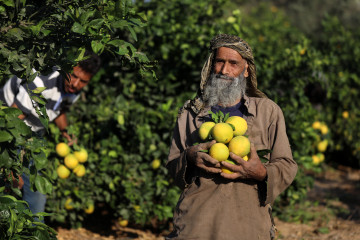

Abdelkarim Wahdan, a local Palestinian farmer from the northern Gazan town of Beit Hanoun, is much happier now after solar panels were installed into his rented 30-acre farm – one kilometre away from the border with Israel.
Since they were installed in October 2022, Abdelkarim has been able to irrigate his land without paying for fuel, a costly luxury in the besieged enclave.
"I've been here since 1984, farming citrus fruits. But after the Second Intifada broke out in 2000, and Israel's frequent bombings, it's been difficult," Abdelkarim told The New Arab.
"The solar panels installed in Abdelkarim's farm are battery-less and save the farmer $100 every time he wants to irrigate his farmland"
In 2006, Israel's attack on the Gaza Strip caused the enclave's main power plant to shut down. Since then, power outrages for at least eight hours occur daily.
"When Israel attacks [Gaza], I can't travel to my farm. Two years ago, in 2021, 10.5 cares of watermelons were destroyed because I wasn't able to irrigate my fruits for eleven consecutive days," Abdelkarim added.
Abdelkarim also shared that, in 2014, when Israel bombed Gaza for 50 days during Operation Protective Edge, he had to move most of his crops out of the farm as Israeli tanks bulldozed his crops and uprooted his land.
"Not only were my fruit-bearing trees destroyed [by Israeli action] but also tens of bee hives have been damaged too."
The solar panels installed in Abdelkarim's farm are battery-less and save the farmer $100 every time he wants to irrigate his farmland. He is the latest recipient of 17 farmers who received solar panels in the northern part of the Gaza Strip.
Adham Abasyouni, spokesperson for the Palestinian Ministry of Agriculture in Gaza, told The New Arab: "We're in continuous contact with various local and international NGOs in the Gaza Strip, such as the European Union, Food and Agriculture Organization, Oxfam and several others. Our collaboration has meant we've been able to assist vulnerable farmers and ensure their most essential needs are met."
In the southern part of the Gaza Strip, in the eastern border village of Alfokhari, grape farmers Abu Mohammad Alza'eem and Mahmoud Honaideq have also benefitted from government and NGO-funded projects.
Abu Mohammad told The New Arab that, with the help of the Union of Agricultural Work Committees, his 1-acre farm is covered with plastic nets that prevent his grapes from over-exposure to the sun and protect them from mosquitos.
"The quality of my grapes has improved," Abu Mohammad beamed. "Before the nets, I used to lose around fifty percent of my crop but now that number is far less."
Abu Mohammad's neighbour Mahmoud has also benefitted. He now is able to irrigate his crop with a smart system that sprays desalinated water into his 2.5-acre farm. According to the UAWC, 30 desalination smart pipes have been installed, mainly in the southernmost parts of the Gaza Strip.
"The pipes have mostly been brought in from Egypt, benefitting 30 farmers across 100 acres of land in Rafah and Khan Younis," Samir Aljbour, the agricultural engineer in charge of the maintenance of the pipes, told The New Arab.
Throughout the Gaza Strip, which is 360 square kilometres in size, there are about 45,000 acres of farmland. Gaza Strip produces various crops, mainly citrus, olives, grapes, vegetables, dates and most recently watermelons.
According to the Ministry of Agriculture in Gaza, a lot of these productions is self-sufficient with only certain fruits such as banana and apple being imported from outside Gaza via Israel-controlled commercial crossings.
Rami Almeghari is a Palestinian freelance journalist living and working in Gaza.
Follow him on Twitter: @writeralmeghari
![Palestinian farmers sort dates at a farm during the harvest season in Deir al-Balah in the central Gaza Strip [Getty Images]](/sites/default/files/styles/medium_16_9/public/2023-02/GettyImages-1244743477.jpg?h=2ffd00db&itok=xftKi3cK)



 Follow the Middle East's top stories in English at The New Arab on Google News
Follow the Middle East's top stories in English at The New Arab on Google News


